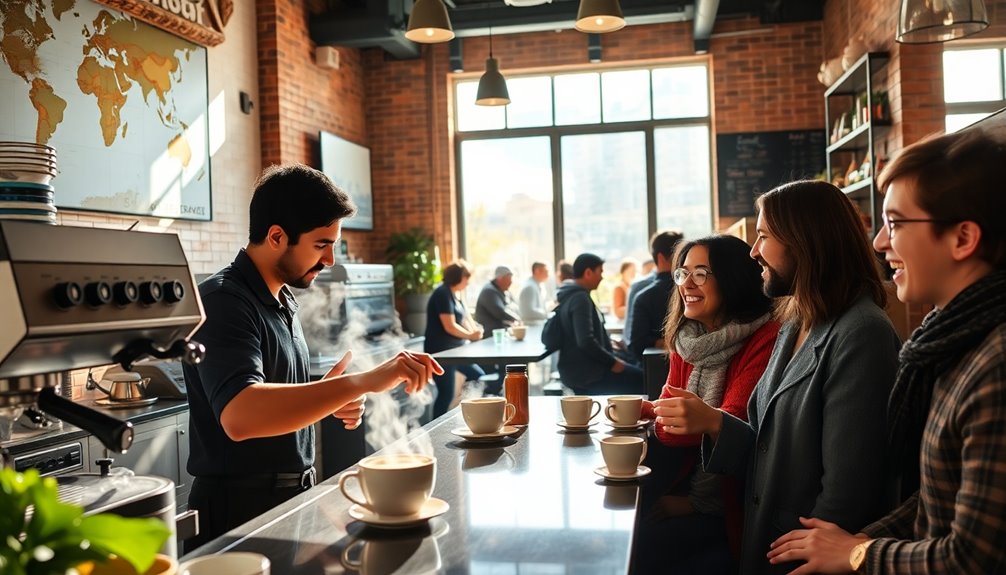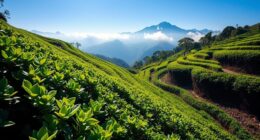You might be surprised to learn how deeply intertwined coffee and human migration are. Originating in Ethiopia, coffee led to trade routes and cultural hubs by the 15th century. As it spread, migration patterns shifted, with coffee cultivation attracting workers to countries like Colombia. This trade not only supports local economies but also fosters cultural exchanges. Urban migration often occurs as farmers seek better opportunities linked to coffee production. Climate change further complicates these patterns, pushing communities to adapt. To uncover more about these connections and their implications, there's much deeper insight waiting for you.
Key Takeaways
- Coffee cultivation attracts workers, creating communities that support local economies and cultural exchanges, notably in Colombia and Ethiopia.
- Historical trade routes facilitated migration, allowing individuals access to better markets and living conditions through coffee production.
- Climate change impacts coffee farmers, prompting migrations that alter local economies and disrupt traditional coffee-growing regions.
- Coffee tourism encourages migration, providing opportunities for people to engage with authentic coffee production experiences and local cultures.
- Globalization has interconnected coffee cultures, influencing migration patterns and consumer preferences towards ethically sourced coffee.
Historical Roots of Coffee
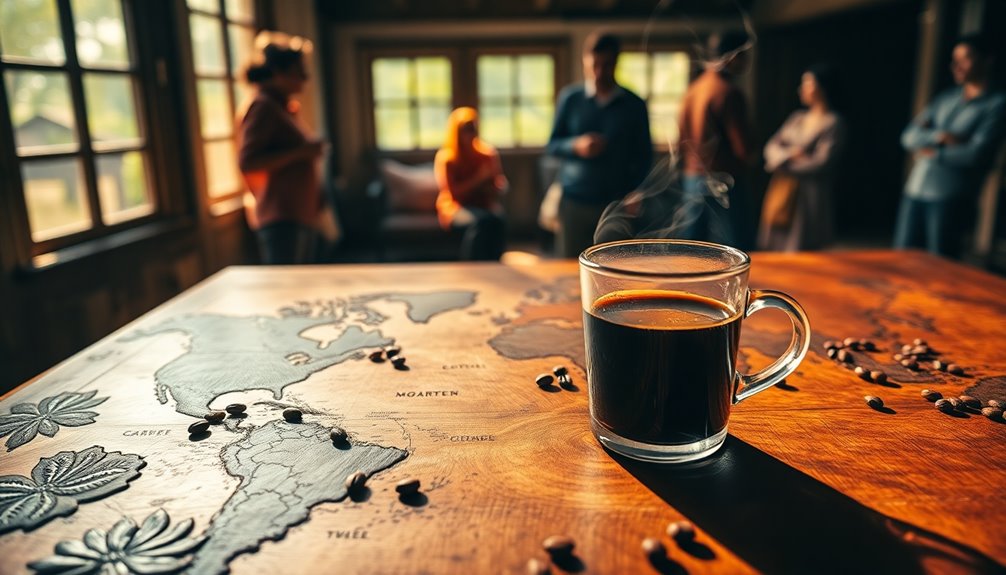
Although coffee's journey began in the Ethiopian region of Kaffa, its impact on human migration patterns is profound and far-reaching.
By the 15th century, coffee made its way to the Arabian Peninsula, sparking early trade routes. The 16th century saw the rise of coffee houses in the Ottoman Empire, becoming cultural hubs that not only facilitated social interactions but also encouraged people to migrate for commerce and ideas.
European colonization in the 17th century led to coffee plantations in the Caribbean and South America, which forced the migration of enslaved Africans.
Migration Patterns and Coffee Culture
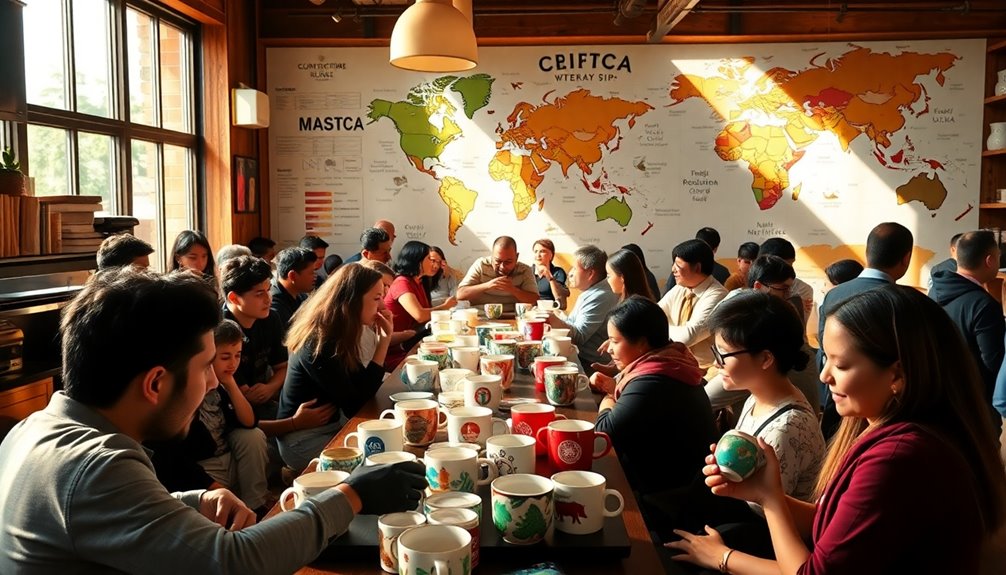
As coffee cultivation thrives in regions like Colombia and Ethiopia, it naturally draws workers from various areas, creating vibrant communities centered around this beloved beverage.
These migration patterns not only boost local economies but also foster a rich cultural exchange. You'll find urban centers where migrants share unique coffee traditions, enriching the coffee culture.
Additionally, historical coffee trade routes have facilitated movement, as farmers seek better markets and living conditions. The rise of coffee tourism has further encouraged migrations, with individuals traveling to experience authentic coffee production firsthand.
However, climate change poses a threat, pushing coffee farmers to migrate to new regions. This displacement considerably impacts local economies and communities, altering the landscape of coffee culture globally.
Coffee's Role in Economic Development
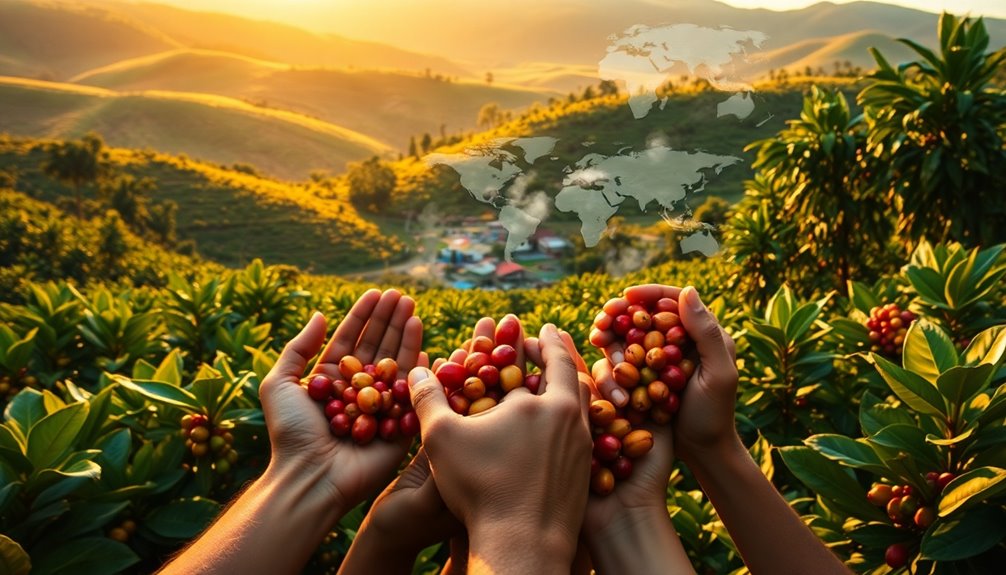
Coffee plays an essential role in economic development, particularly in developing countries where it serves as an important source of income. As the second most traded commodity globally, coffee greatly impacts the economies of producing nations.
Millions of smallholder farmers rely on the global coffee trade for their livelihoods, fostering rural development in coffee-growing regions. In countries like Ethiopia and Colombia, coffee production not only shapes cultural identity but also contributes greatly to national GDP.
The demand for labor in the coffee industry often pushes individuals from rural areas to urban centers, seeking better opportunities. By investing in sustainable coffee initiatives, you can help enhance economic resilience, create jobs, improve living standards, and reduce poverty levels in these communities.
Cultural Exchange Through Coffee
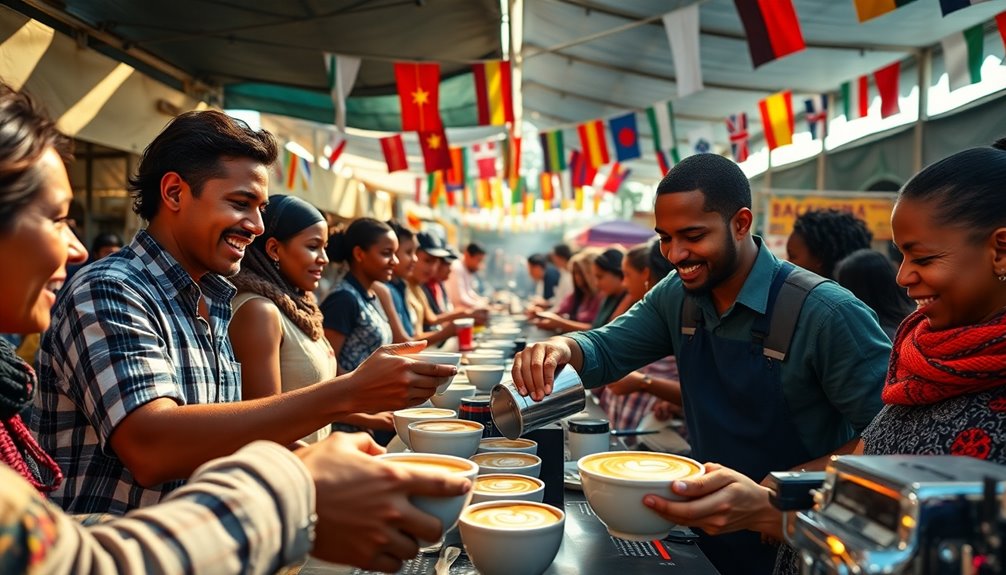
You might be surprised to learn how coffee has shaped global traditions and fostered cultural exchange.
As you explore the evolution of coffee practices, you'll see how baristas from different backgrounds share their unique brewing techniques and flavors.
Events like coffee festivals not only celebrate this rich heritage but also create opportunities for networking and collaboration among coffee lovers worldwide.
Global Coffee Traditions Evolution
While exploring the world of coffee, you'll discover how it serves as a catalyst for cultural exchange and evolution.
Coffee's journey from Ethiopia to global prominence illustrates significant cultural shifts. Here are three key aspects of this global change:
- Social Hubs: Coffeehouses emerged in 17th-century Europe, becoming centers for idea exchange, fostering creativity and collaboration.
- Unique Traditions: Each coffee-producing nation, like Italy and Ethiopia, developed distinct customs, enriching the global coffee narrative with local flavors and practices.
- Coffee Tourism: Regions like Lviv highlight their heritage, blending local and global coffee culture, enhancing community engagement and economic growth.
Additionally, the rise in demand for sustainable products encourages coffee producers to adopt eco-friendly practices, further intertwining coffee culture with social responsibility.
These elements not only showcase coffee's rich history but also emphasize its role in shaping intercultural dialogues across the globe.
Cross-Cultural Barista Practices
As baristas from diverse cultural backgrounds share their unique brewing techniques, the art of coffee preparation transforms into a dynamic platform for cultural exchange.
You'll notice how cross-cultural barista practices enrich coffee shops, showcasing heritage through distinct flavor profiles. International barista competitions celebrate these skills, drawing attention to the artistry involved.
Techniques like the Vietnamese drip coffee method and Italian espresso have gained global popularity, allowing enthusiasts to experience different cultures in every cup.
Coffee shop environments serve as melting pots, where baristas share stories and culinary traditions, fostering connections among customers.
Additionally, the rise of coffee tourism encourages baristas to incorporate local ingredients, enhancing visitor experiences while highlighting the cultural significance of coffee in their regions.
Coffee Festivals and Networking
Coffee festivals act as vibrant hubs for cultural exchange, uniting coffee producers, enthusiasts, and industry professionals to celebrate the rich tapestry of global coffee culture.
These events foster networking opportunities and collaboration, bridging local and international coffee communities.
Here are three key benefits of attending coffee festivals:
- Workshops and Tastings: Engage in hands-on experiences that deepen your understanding of coffee origins and production processes.
- Networking Opportunities: Connect with baristas, producers, and industry leaders, enhancing your professional relationships and collaborations.
- Cultural Exchange: Experience diverse traditions and practices, enriching your appreciation of coffee shops worldwide.
Additionally, these festivals often highlight the health benefits of coffee, showcasing its role in promoting wellness within communities.
Through these festivals, you'll see how coffee connects people, cultures, and migration patterns, while promoting sustainable development in communities.
Coffee as a Symbol of Connection
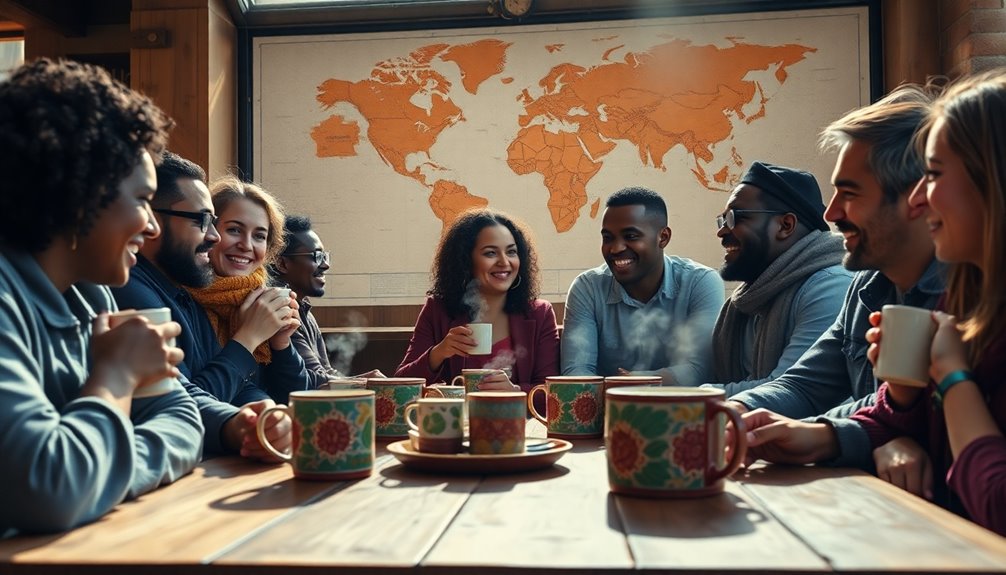
When you share a cup of coffee, you're tapping into a rich tradition of connection that transcends cultures and generations. This beloved beverage serves as a social connector, fostering conversations in family gatherings and professional meetings alike. The aroma evokes nostalgia, making it a staple in social interactions.
Coffee shops, once dubbed "penny universities," have long been spaces for creativity and networking. In communal settings, coffee consumption promotes collaboration, enhancing creativity and productivity. Additionally, the calming effects of music therapy can further amplify the relaxed atmosphere of coffee gatherings.
Here's how coffee symbolizes connection across cultures:
| Cultural Aspect | Significance |
|---|---|
| Hospitality | Welcomes guests |
| Tradition | Bridges generational gaps |
| Community Building | Fosters social ties |
| Creativity | Sparks new ideas |
| Social Change | Encourages dialogue |
The Impact of Globalization on Coffee

Globalization has dramatically reshaped the coffee industry, turning it into a global phenomenon that connects diverse cultures and economies. This transformation has several key impacts:
- Diverse Sourcing: Over 25 million farmers in more than 70 countries produce global coffee, allowing multinational companies to create extensive supply chains.
- Consumer Awareness: Increased coffee consumption in markets like the U.S. and Europe has led to a surge in coffee shop culture, with consumers becoming more conscious of ethical sourcing.
- Specialty Coffee: The rise of unique coffee varieties has enabled producers to differentiate their products, promoting sustainable farming practices.
Through these changes, globalization hasn't only expanded the coffee market but also improved economic opportunities for those involved in coffee production. Additionally, maintaining positive energy in the industry can influence opportunities for both farmers and consumers alike.
Coffee Traditions Across Nations
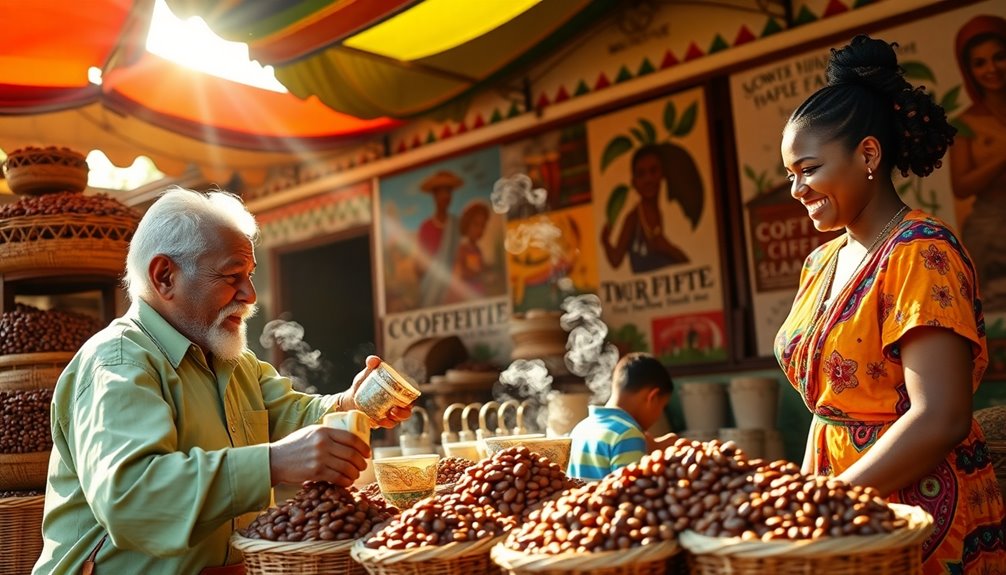
When you explore coffee traditions around the world, you'll notice how each culture shapes its unique brewing techniques.
From the communal ceremonies in Ethiopia to the quick espresso shots in Italy, coffee reflects deep cultural influences and social interactions.
Understanding these regional practices not only enriches your coffee experience but also highlights the global journey of this beloved beverage.
Cultural Influence of Coffee
Although coffee is enjoyed worldwide, its cultural significance varies immensely from one nation to another. The cultural influence of coffee shapes local customs, rituals, and identities.
Here are three notable examples:
- Ethiopia: The coffee ceremony involves roasting, brewing, and sharing coffee in a communal setting, symbolizing hospitality and community.
- Italy: Espresso culture highlights the art of coffee preparation and consumption, influencing daily life and social interactions.
- Colombia and Brazil: Coffee serves as a national identity, impacting music, art, and driving the economy in rural areas.
These traditions not only enhance local experiences but also foster community, creativity, and cultural exchange, demonstrating coffee's essential role across different societies. Moreover, the brewing methods employed in these cultures often reflect their unique traditions and enhance the coffee experience.
Regional Brewing Techniques
Across the globe, coffee brewing techniques reflect unique cultural identities and local preferences. Each region has adapted its methods, showcasing change through time and tradition. Here's a snapshot of some remarkable brewing styles:
| Region | Brewing Technique |
|---|---|
| Italy | Espresso – A quick, concentrated shot of coffee. |
| Ethiopia | Coffee Ceremony – Roasting and brewing in a jebena. |
| Vietnam | Phin – Drip method with sweetened condensed milk. |
In France, the French press immerses grounds for a rich flavor, while the U.S. embraces cold brew, steeping coarsely ground coffee in cold water. Each technique not only serves a beverage but also tells a story of migration and cultural influence, making your coffee experience truly global. Additionally, coffee health benefits such as improved digestion and enhanced cognitive function are often linked to these diverse brewing practices.
Future Trends in Coffee Migration

As climate change reshapes our world, coffee cultivation is likely to follow suit, shifting to higher altitudes and cooler climates. You’ll see this particularly in East Africa and Central America. This adaptation will not only influence the flavor profiles of the beans but also the economic viability of regions that have relied on coffee as a cash crop. As farmers adjust to new conditions, the future coffee trends for 2025 will likely reflect these changes, showcasing innovative farming practices and possibly a diversification of coffee varieties that thrive in a warmer, more variable climate.
Future trends in coffee migration will be influenced by several factors:
- Sustainable Practices: Farmers will focus on making coffee sustainably, adapting to market demands and diversifying crops.
- Economic Opportunities: Fluctuating coffee prices may push producers toward regions with better economic conditions or urban areas.
- Technological Advancements: Improved irrigation and disease-resistant varieties will help farmers expand operations in previously unsuitable areas.
These shifts won't only redefine where coffee is grown but also how you experience your favorite brew, connecting you to a global, evolving coffee culture.
Frequently Asked Questions
How Was Coffee Connected to the Enlightenment the Age of Reason and the French Revolution?
Coffee played an essential role during the Enlightenment and the French Revolution by fostering discussions among thinkers like Voltaire and Rousseau.
In coffeehouses, you'd engage in debates that challenged traditional authority and governance, encouraging reason and individual rights.
As coffee consumption rose in 18th-century France, it shifted public opinion, fueling revolutionary ideas and symbolizing anti-aristocratic sentiment among the emerging bourgeois class who sought to promote democratic ideals over established order.
How Does Coffee Relate to Culture?
Coffee's like a bridge, connecting you to cultures near and far. When you sip that rich brew, you're tasting centuries of tradition—each cup tells a story.
You'll find local rituals, unique recipes, and vibrant coffee shops, buzzing with conversations and creativity. As you explore coffee's global presence, you engage with communities, fostering connections that transcend borders.
It's more than just a drink; it's a celebration of shared experiences and diverse identities.
Conclusion
In exploring the surprising connections between coffee and human migration, you see how this beloved beverage transcends borders and fosters connections. As the saying goes, "A cup of coffee shared with a friend is happiness tasted and time well spent." With each sip, you partake in a rich tapestry of cultural exchange and economic development. As coffee continues to evolve globally, it'll remain a powerful symbol of unity, reflecting our shared experiences and journeys.
